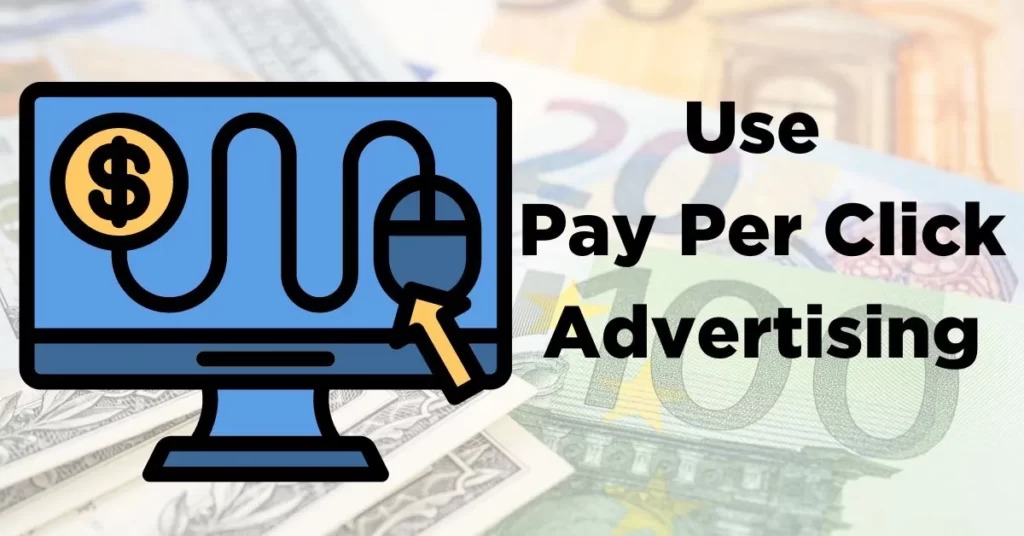Use Pay-Per-Click Advertising: In today’s fast-paced digital world, businesses are constantly searching for effective strategies to gain a competitive edge. One such powerful tool is Pay-Per-Click (PPC) advertising. Whether you’re an established company or a startup looking to make a mark, PPC can significantly impact your online presence and drive impressive results. In this blog, we will explore what PPC advertising is, its benefits, and how you can leverage it to grow your online business.

Use Pay-Per-Click Advertising
PPC advertising is a marketing model that allows businesses to display their ads on various online platforms, such as search engines and social media networks, and pay only when someone clicks on their ad. Popular platforms like Google Ads and Facebook Ads enable advertisers to bid on specific keywords or target demographics to reach their desired audience.
The Benefits of PPC Advertising
- Instant Visibility:
Unlike organic search or other marketing methods, PPC provides instant visibility on the search engine results page or social media feeds, putting your brand right in front of potential customers when they are actively searching for products or services like yours. - Highly Targeted:
With PPC, you can precisely target your audience based on factors like demographics, interests, location, and search intent. This ensures that your ad reaches the right people at the right time, increasing the likelihood of conversion. - Budget Control:
PPC advertising allows you to set a daily or monthly budget, giving you complete control over your ad spend. You can start small and scale up as you see positive returns on your investment. - Measurable Results:
Unlike traditional advertising methods, PPC provides detailed insights and analytics. You can track your campaign’s performance, including the number of clicks, impressions, conversions, and return on investment (ROI). - Enhances SEO Efforts:
PPC and Search Engine Optimization (SEO) go hand in hand. By using PPC to target specific keywords, you can gather valuable data on the effectiveness of those keywords, which can inform your SEO strategy. - Adaptable and Flexible:
PPC campaigns can be quickly adjusted or optimized based on performance data. This flexibility allows you to react to market trends, competition, or changes in your business goals.
Getting Started with PPC Advertising
- Set Clear Goals:
Before diving into PPC, define your objectives. Whether it’s increasing website traffic, generating leads, or driving sales, a clear goal will help you design an effective PPC campaign. - Keyword Research:
Conduct thorough keyword research to identify relevant and high-converting keywords for your ads. Tools like Google’s Keyword Planner can assist in discovering keywords with decent search volume and manageable competition. - Compelling Ad Copy:
Write engaging and persuasive ad copy that speaks directly to your target audience. Highlight unique selling points, promotions, or any special offers to entice users to click on your ad. - Optimized Landing Pages:
Ensure that your ads lead to relevant and optimized landing pages. A seamless user experience from ad to landing page improves the chances of conversion. - Monitor and Optimize:
Regularly monitor your PPC campaigns to identify what’s working and what’s not. Use the data to make informed decisions and continually refine your ads for better results. - A/B Testing:
Experiment with different ad variations to see which ones perform best. A/B testing can help you understand user preferences and refine your messaging.
Avoiding Common Pitfalls
While PPC can be highly effective, it’s crucial to avoid some common pitfalls:
- Overbidding:
Don’t get carried away with bidding wars. Keep your budget in check and focus on targeting relevant keywords. - Ignoring Negative Keywords:
Negative keywords prevent your ads from showing up in irrelevant searches, saving your budget for more valuable clicks. - Ignoring Mobile Users:
With a significant portion of internet traffic coming from mobile devices, ensure your ads and landing pages are mobile-friendly. - Lack of Conversion Tracking:
Implement conversion tracking to measure the success of your campaigns accurately.
Conclusion
Pay-Per-Click advertising is a dynamic and results-driven marketing tool that can significantly impact your online business growth. By understanding the benefits of PPC and implementing a well-thought-out strategy, you can drive relevant traffic, generate leads, and increase conversions. Remember to continually analyze and optimize your campaigns, and with dedication and creativity, you can harness the full potential of PPC to achieve remarkable success in the digital landscape.












